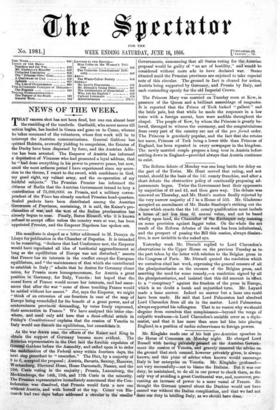His manifesto is shaped as a letter addressed to M.
Drouyn de Lhuys for publication in the Chamber of Deputies. It is intended to be reassuring, "declares that had Conference met, the Emperor would have repudiated all idea of territorial aggrandizement so long as the equilibrium of Europe was not disturbed," asserts that France has no interests in the conflict except the European equilibrium, and "the maintenance of that which she contributed to establish in Italy ;" admits that he desires for Germany closer union, for Prussia more homogeneousness, for Austria a great position in Germany, for Italy, Venetia; but hoped that the moral force of France would secure her interests, and had assur- ances that after the war "none of those touching France would be settled without her assent." But, says the Emperor, we might "think of an extension of our frontiers in case of the map of Europe being remodelled for the benefit of a great power, and of conterminous provinces demanding, by votes freely expressed, their annexation to France." We have analyzed this letter else- where, and need only add here that a dead-official article in Friday's Constitutionnel explains that the cession of Venetia to Italy would not disturb the equilibrium, but consolidate it.






























